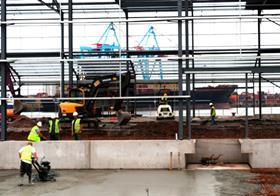
Construction work has begun on a new, €7.6m (£6m) fresh produce terminal at the Port of Liverpool in north-west UK.
The project, which is due for completion in October, aimed at dramatically reducing the number of road miles travelled by transport supplying the UK market.
The new facility will be located at Liverpool's Royal Seaforth Dock and is set to enable the transfer of thousands of tonnes of fruit and vegetables from road transit to seafreight.
Go-Associates, the firm behind the development, is initially targeting the Spanish fresh produce season, offering a cost effective all-water alternative to the 300 trucks trundling into the UK from mainland Europe every day with fruit from Spain.
The company's operations director Andy Rickard pointed to the 2m tonnes of fresh produce supplied to the UK by Spain every year, half of it destined for the north of the country. “Most of this major trade is moved by road on trucks carrying just 26 pallets each from the main growing areas of Spain,” he said. “The situation cries out for high volume direct delivery by sea.”
Liverpool Produce Terminal will offer a state-of-the-art fresh produce handling centre capable of discharging a 5,000-pallet vessel in 24 hours and ideally located to reach any part of the UK market of 30m people within a truck driver’s tachograph driving day.
“Liverpool Produce Terminal will maintain the cool chain but eliminate up to two truck journeys from the logistics chain – the journey to and from the packhouse – as we are planning to open a packhouse adjacent to the terminal,” confirmed Mr Rickard.
The 90,000ft2 coolstore, located alongside the Royal Seaforth Container Terminal and the site of the Port of Liverpool’s planned post-Panamax River Container Terminal, set to cost in excess of €126.4m (£100m), will be operated around the clock, employing as many as 100 permanent and supplemental staff.
Go-Associates has reported an enthusiastic response to the Liverpool facility from fresh produce suppliers and buyers, acccording to Mr Rickard: “Food shippers are increasingly responsive to growing public concern about greenhouse emissions and the contribution to this problem made by road haulage,' he said. “As sighted by the recent commitment of some 40 members of the food and drink industry federation to cut the environmental and social impact of domestic food transport by 20 per cent by 2012.”
“Ten million tonnes of fresh produce are shipped into the UK each year and half of it comes up to the northern half of the country,' he continued. 'It makes economic and environmental sense to bring that volume to the deepsea port that is closest to the population of 30 million people and is served by the best motorway network for rapid distribution direct to supermarkets.”
Frank Robotham, marketing director of Peel Ports Group, which owns and operates the Port of Liverpool, said: “The development of Liverpool Produce Terminal is another example of how the Port of Liverpool with its central location, continues to make major contributions to the reduction of truck road miles. LPT is set to make a most significant contribution to the food transport industry’s response to economic and environmental pressure to cut food miles and the carbon footprint.”
He added: “The terminal will also enable Peel Ports Group to supply fresh produce to the whole of the UK through the new facility at the Port of Liverpool in the north and its established operations at the Port of Sheerness in the south-east of England.”



